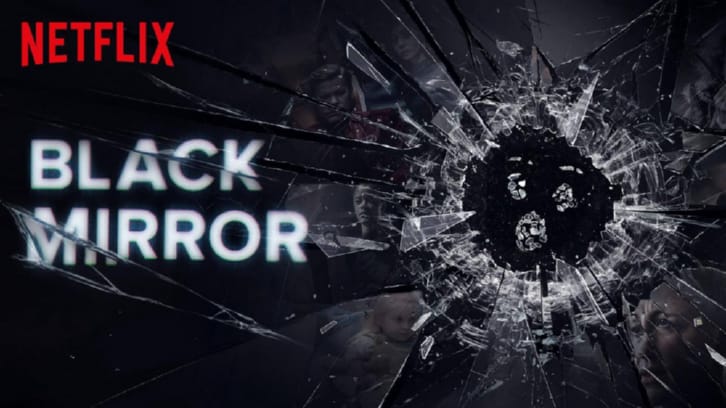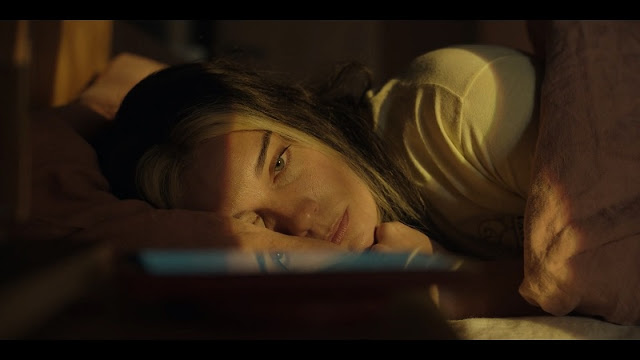
HEAVY SPOILERS AHEAD ABOUT "JOAN IS AWFUL", MILD SPOILERS ABOUT THE OTHER EPISODES!
A woman wakes up. She brushes her teeth. She has some breakfast. She goes to work, where she has to inconveniently fire a coworker. Then it’s therapy time, and she recognizes how unhappy she’s been with her life. Her job at a big company is not fulfilling — she still dreams of owning a coffee shop. She doesn’t love her boyfriend; their relationship seems flavorless to her, especially when compared to the one she had with her ex, who’s been texting and wants to see her again. Her choices in life are not genuine, she fears; it’s like someone else is choosing for her. It’s inevitable: she leaves therapy eager to become the protagonist of her own life.
She accepts to see her ex-boyfriend. They meet. He wants to get back with her. They kiss — or better, she is reluctantly and briefly kissed by him, then it’s time to go home feeling guilty as hell. And hell is indeed about to break loose when, after returning home, she reunites with her partner to watch a new streaming show about a woman who wakes up, brushes her teeth, goes to work, fires someone, goes to therapy, meets her ex, shares a moment with him, and then returns home to watch a new streaming show with her partner about her life...
After four years on hiatus, Black Mirror is back with five new stories. And this season, at first glance, is unlike any other. Since its beginning, the show has tackled politics, death, grief, love, and human condition altogether through science fiction, focussing especially on the relation between humanity and technology. Giving the show’s anthological nature, episodes of Black Mirror have assumed many forms, though usually falling into pessimistic, cautionary tales settled in different versions of our world (including some dystopian scenarios) that share the common denominator of being populated by wild, dazzling technologies. Sometimes, they also deal with already existent, everyday life tech, using it in unthinkable ways: for instance, the first episode from the first season, The National Anthem, doesn’t present new, inventive tech, but uses the tech we know to conduct shocking events, discussing its themes amid the plausible and the unexpected.
However, in its sixth season, something changed. The new episodes feel different when compared to those released years ago. Some changes are very clear, while others are more subtle.
The first episode, Joan is Awful, is a good example of a subtly different story that at first glance feels like home. After Joan (Annie Murphy) discovers private information about her is being used as the primary source for an AI generated streaming show starring Salma Hayek as Joan, her life is turned upside down. Joan ends up losing her job, partners and friends, while also being mistreated by her neighborhood.
Legally, there is nothing she can do to stop the program from airing daily, as Joan accepted the terms and conditions for using Streamberry (without reading it, which is quite relatable, I must admit.) Joan signed up for it; out of options, she decides to make Salma Hayek regret associating her image to her life, which eventually leads both of them to a quest deep into Streamberry entrails.
The first half of the episode is riveting: it’s like The Truman Show, but a version of it in which the one being watched knows from the beginning their life’s been turned into content, and there’s little they can do about it. It’s fascinating because there’s so many possibilites; if Joan didn’t succeed to break into Streamberry, what would she do with the knowledge that every step taken and word said could be watched by billions? Would she start doing more crazy, unhealthy things like the one she did to attract Salma to her house? Or would she try to become a part of the system somehow, using all the attention suddenly given to her as a way to, huh, making her dreams come true — like Bing from Fifteen Million Merits did on the second episode from the show's first season? If the platform is using its subscribers data to create content, and this content must highlight the uglier parts of everyone, what kind of life one should have to please the algorithm? This could lead someone to very dark, painful answers, and I was all there for that.
But when the episode leaned into a lighter path (Joan and Salma break into the company, and Joan succeeds in destroying the TV show generating machine that was also part of a big plan to make shows about all the subscribers lives,) my sense of wonder towards it lowered a lot. It went from the possibility of something complex, instigating and nuanced to the reality of evil plans menacing the whole world. Then everything ended too easily.
And I write that as someone who enjoyed the ending, as incredible as it may seem — the plot twist and the last minutes in the real world were nice, and I appreciated Source Joan (Kayla Lorette) living her dream and having some fun with her friend Annie Murphy. But the whole journey could have gone deeper into its themes, adding more personal challenges that would have made the ending feel earned by the main characters. Also, there was a possibility of discussion towards artificial intelligence and the need for immediate, faster-than-light entertainment there too, which endep up neglected amid all the rest (a pity.) That’s why this episode is, for me, subtly different from others: it's all about crazy possibilites involving tech and society, but lacks that bitter rawness necessary to tackle uncomfortable matters and complex conflicts that Black Mirror usually has.
Loch Henry, on the other hand, is an episode that could be seen as too ordinary for this show. There’s no crazy new tech, no inventive usage of existent devices for outrageous things — the story, just like the Joan one, works with our relation with media, entertainment and what’s being turned into “content” these days, which could mean that the outrageous thing depicted here is happening too often in our reality, thus we are not shocked or surprised by it (but it still is, our should be, outrageous, regarding we recognize it as such or not.) Here, a young couple travels to a Scottish town and stumbles on violent crimes from the past and dark family secrets. Davis (Samuel Blenkin) and Pia (Myha'la Herrold) desire to make a documentary about the incidents that ended up killing Davis’ father and also made Loch Henry lose its tourism potential. The truth is revealed close to the end, leading to an anticlimatic confrontation, so simple, and yet so brutal. At the end of this one, I felt a raw bitterness; the main character was lost in so much pain, and the chain of events that led to it was silly in such a believable way that everything felt real for a moment.
About episodes three and four, they're not the worst of the show, but both left me with mixed feelings. Beyond the Sea takes all the time it needs to tell a story that at first I mistakenly thought to be about love. But the time it takes feels too long in the beginning, and by the end of it, it feels wasted as well. This one is a tale about relationships, the marital ones, the ones we have with coworkers — but there’s no love here, just trauma, damages caused by possessiveness and the emptiness of a “huge, important mission” that is actually pointless. I ended Beyond the Sea outraged, and I’m still conflicted by its ending; things all of a sudden got so violent and dark, and I'm unsure if I like how the whole thing was conducted. The fourth episode, Mazey Day, also gets pretty surprising by the end, mixing the traditional Black Mirror approach with a horror twist that I wasn’t expecting (and that helps to pave the way for the surprising finale.) Regardless of its twist, Mazey Day is bland overall — it is funny, but it lacks something, so I enjoyed the ride, but forgot most of it right after it ended.
 Now, Demon 79 is a whole different thing. It’s not a Black Mirror story — as far as I’m concerned, it’s a Red Mirror tale. In Northern England, 1979, in times of election campaigns, Needa (wonderfully played by Anjana Vasan) is a sales assistant that encounters an ancient artefact that connects her with Gaap (Paapa Essiedu, joyful and impressive in this role), a demon that must prove himself by guaranteeing that Needa commits three murders to prevent a disaster that will extinguish humanity. Technology is out of focus, giving way to fantasy and horror. This shift surprised me, as magical artefacts and demons are new to this show, but I loved every second of it, as I feel it represents a possibility for Black Mirror to reinvent itself as a whole for the years to come, now having the chance to investigate themes regarding human nature and society using fantastical allegories. As Demon 79 uses the Cold War as the background for the imminent disaster that will end the world if Needa doesn’t kill some people, it deals with the xenophobia and racism its main character faces daily from the world around her, tackling in a resonating way all the hard feelings that come from being oppressed. It’s brutal, it’s shocking, it’s intense. It’s also a fun ride that ends with enough bitterness for it to leave a impression, but with the adequate amount of satisfaction for it to leave a good one.
Now, Demon 79 is a whole different thing. It’s not a Black Mirror story — as far as I’m concerned, it’s a Red Mirror tale. In Northern England, 1979, in times of election campaigns, Needa (wonderfully played by Anjana Vasan) is a sales assistant that encounters an ancient artefact that connects her with Gaap (Paapa Essiedu, joyful and impressive in this role), a demon that must prove himself by guaranteeing that Needa commits three murders to prevent a disaster that will extinguish humanity. Technology is out of focus, giving way to fantasy and horror. This shift surprised me, as magical artefacts and demons are new to this show, but I loved every second of it, as I feel it represents a possibility for Black Mirror to reinvent itself as a whole for the years to come, now having the chance to investigate themes regarding human nature and society using fantastical allegories. As Demon 79 uses the Cold War as the background for the imminent disaster that will end the world if Needa doesn’t kill some people, it deals with the xenophobia and racism its main character faces daily from the world around her, tackling in a resonating way all the hard feelings that come from being oppressed. It’s brutal, it’s shocking, it’s intense. It’s also a fun ride that ends with enough bitterness for it to leave a impression, but with the adequate amount of satisfaction for it to leave a good one.Overall, while this season is an improvement over the last one, it's also a collection of irregular stories that will not please everyone, as each of them tries something different from each other and from what came before. This desire to navigate new waters without completely abandoning the old ways is, for me, both the triumph and the biggest flaw of this batch of episodes. All of this to say that I’m always satisfied with more Black Mirror, and that I love when the show fearlessly tries new things, so I hope there’s more to come, black and red tales alike.
What about you, did you enjoy this season? Leave a comment if you also feel the need to talk about how much it hurt to watch a certain character not die in Demon 79.
Thanks for reading, and so long!



